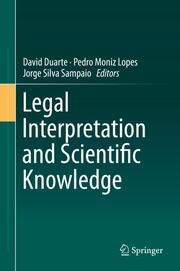Detailansicht
Legal Interpretation and Scientific Knowledge
ISBN/EAN: 9783030186708
Umbreit-Nr.: 7061396
Sprache:
Englisch
Umfang: ix, 251 S., 3 s/w Illustr., 251 p. 3 illus.
Format in cm:
Einband:
gebundenes Buch
Erschienen am 08.10.2019
Auflage: 1/2019
- Zusatztext
- This book discusses the question of whether legal interpretation is a scientific activity. The law's dependency on language, at least for the usual communication purposes, not only makes legal interpretation the main task performed by those whose work involves the law, but also an unavoidable step in the process of resolving a legal case. This task of decoding the words and sentences used by normative authorities while enacting norms, carried out in compliance with the principles and rules of the natural language adopted, is prone to all of the difficulties stemming from the uncertainty intrinsic to all linguistic conventions. In this context, seeking to determine whether legal interpretation can be scientific or, in other words, can comply with the requirements for scientific knowledge, becomes a central question. In fact, the coherent application of the law depends on a knowledge regarding the meaning of normative sentences that can be classified (at least) as being structured, systematically organized and tendentially objective. Accordingly, this book focuses on analyzing precisely these problems; its respective contributions offer a range of revealing perspectives on both the problems and their ramifications.
- Kurztext
- This book discusses the question of whether legal interpretation is a scientific activity. The law's dependency on language, at least for the usual communication purposes, not only makes legal interpretation the main task performed by those whose work involves the law, but also an unavoidable step in the process of resolving a legal case. This task of decoding the words and sentences used by normative authorities while enacting norms, carried out in compliance with the principles and rules of the natural language adopted, is prone to all of the difficulties stemming from the uncertainty intrinsic to all linguistic conventions. In this context, seeking to determine whether legal interpretation can be scientific or, in other words, can comply with the requirements for scientific knowledge, becomes a central question. In fact, the coherent application of the law depends on a knowledge regarding the meaning of normative sentences that can be classified (at least) as being structured, systematically organized and tendentially objective. Accordingly, this book focuses on analyzing precisely these problems; its respective contributions offer a range of revealing perspectives on both the problems and their ramifications.
- Autorenportrait
- David Duarte is a Professor at the Faculty of Law of the University of Lisbon where he was awarded his PhD. He is also a Main Researcher at CIDP-Lisbon Centre for Research in Public Law and member of LxLTG (Lisbon Legal Theory Group), as well as member of the Board of Directors of the Portuguese Association for Legal Theory, Legal Philosophy and Social Theory (ATFD). His main fields of research are legal theory, fundamental rights, and administrative law. Pedro Moniz Lopes is an Assistant Professor of Public Law at the University of Lisbon - Law School, a Main Researcher at CIDP-Lisbon Centre for Research in Public Law and member of LxLTG (Lisbon Legal Theory Group). He graduated, earned his Masters and completed his PhD at the University of Lisbon - Law School where he has been lecturing since 2008. His main fields of research are legal theory and legal science, constitutional and administrative law and human rights. He is the executive director of e-Pública law journal of the Lisbon Centre for Public Law. Jorge Silva Sampaio is a Ph.D. researcher and a guest lecturer at the University of Lisbon School of Law, an associate researcher at CIDP-Lisbon Centre for Research in Public Law and member of LxLTG (Lisbon Legal Theory Group). His main fields of research are legal theory and legal science, constitutional and administrative law and human rights.
